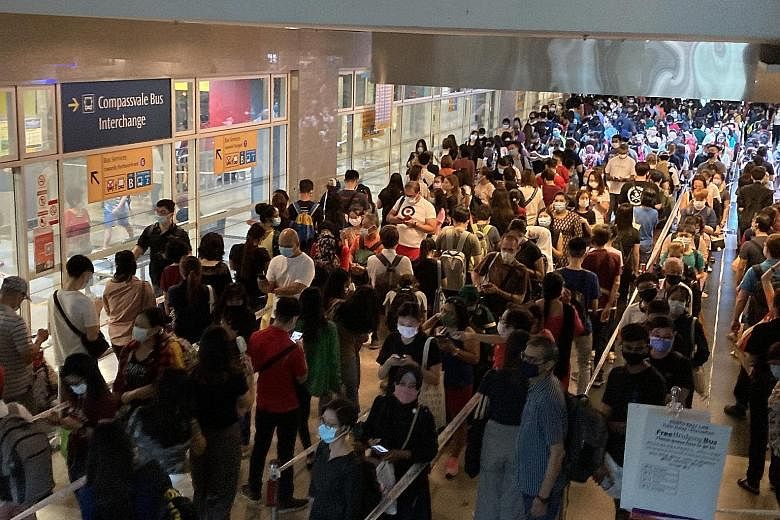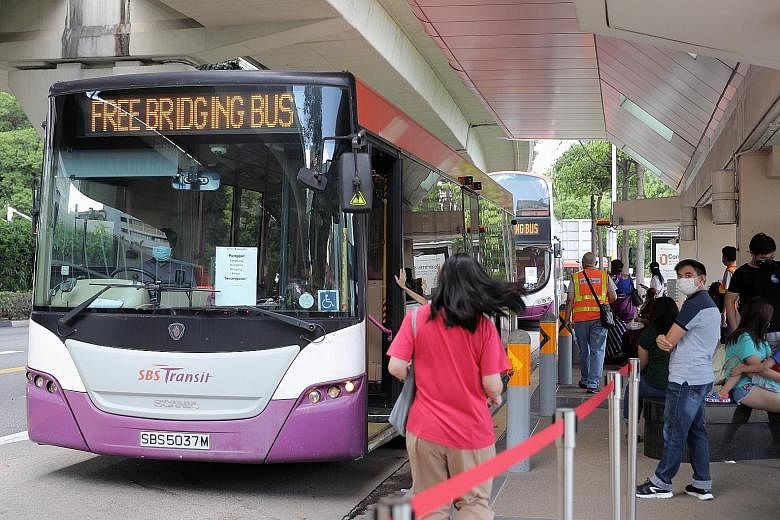A power fault led to a three-hour-long disruption between Serangoon and Punggol stations on the North East Line (NEL) yesterday.
Train services came to a halt between the two stations at about 7am, and resumed after repairs were completed at about 9.53am.
Services between HarbourFront and Serangoon stations continued to operate during yesterday's stoppage.
Free regular and bridging bus services were also provided at designated bus stops between Serangoon and Punggol stations.
There are four other stations between these two stations.
Bridging buses and free bus rides ceased at about 10.18am.
"We apologise to all passengers for the inconvenience caused," said NEL operator SBS Transit.
In a statement, it noted that the fault occurred in the overhead catenary system, which supplies power to trains. The NEL is the only MRT line to be powered by the system, which is installed on the ceiling of train tunnels.
SBS Transit said a segment of the system was damaged at Buangkok station and repairs were carried out immediately.
Its engineers found that the insulator in the overhead catenary system had failed.
-
Other power-related disruptions
-
Feb 27, 2020
A six-hour-long disruption affected peak hour traffic along three stations on the NEL - Punggol, Sengkang and Buangkok.
Initial investigations showed the delay was due to a broken contact wire that affected power supply to trains launching from the Sengkang depot, said SBS Transit in a statement then.
Oct 26, 2015
The two-hour disruption affecting the entire line happened after a new train undergoing testing damaged the overhead catenary system. It was returning to the depot from the mainline.
Investigations revealed that the train was being manually driven when the driver saw sparks from above the train and stopped the train immediately.
The train stopped at a stretch where the mainline and depot catenary system wires overlap, resulting in arcing between the two wire sections.
Arcing occurs at the overlap point because of the voltage difference between the mainline and depot catenary systems. This is not a problem during normal operations as NEL trains are driverless and will not stop at this overlap point, said the Land Transport Authority (LTA) and SBS Transit in a joint statement on Nov 27, 2015.
LTA and SBS added then that they were working together to enhance the design of the catenary system to minimise the likelihood of a recurrence.
Oct 13, 2015
The disruption between Farrer Park and Hougang stations that lasted for one hour and 40 minutes was due to a power fault, which caused the main circuit breaker to trip.
The power fault was triggered by a "malfunction of a component in the electrical switchgear at a substation" that supplied electricity to power the trains running between these stations.
This caused the main circuit breaker to trip. Power was then diverted to a backup breaker that also tripped.
Jan 10, 2013
A six-hour-long disruption affected about 58,000 commuters after services between Dhoby Ghaut and HarbourFront stations went down.
The disruption was traced to three broken U-bolts between HarbourFront and Outram Park stations. This caused a misalignment in the overhead catenary system which resulted in a power trip.
U-bolts are responsible for holding the overhead catenary system's cantilever arms in position.
Further investigations showed that the U-bolts had been corroded by chlorine and traces of ammonia were found at the affected stretch of the train tunnel.
August 2012
Like in the January 2013 incident, U-bolts had been corroded, leading to a disruption.
March 2012
The incident was caused by chloride from tunnel water seepage that corroded balance weight anchor wires, breaking them. These wires are responsible for holding the overhead catenary system wires in place.
Ng Keng Gene and Cheryl Tan
"This was similar to the fault that had occurred in February 2020 where the insulator was a two-piece design that had fractured, causing it to fail," said SBS Transit.
Following that incident, it decided to replace the two-piece insulator with a single piece.
Replacement works could be carried out only from September last year due to a delay caused by Covid-19.
About 30 per cent of the 112 insulators have been changed so far.
SBS Transit said that following yesterday's incident, it will be accelerating the replacement of the remaining insulators and target to complete this by June this year, instead of September as originally planned.


